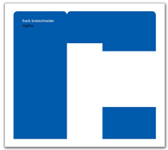|
|
 |
Dusted Reviews
Artist: Signal / Frank Bretschneider Album: Robotron / Rhythm Label: Raster-Noton Review date: Aug. 29, 2007 |

|
|
|
 |
A paradox presents itself when listening to releases from the Raster-Noton camp. Their most conceptually rigid releases are full of the most throw-down electronic funk this side of Timbaland and that side of minimal techno, but the tracks rarely coalesce into anything resembling a club banger. The pieces get the party cold, not started, and the label’s curious and brilliant flirtation with hip hop and techno mechanics generates both tension through denial of catharsis and frustration for its refusal to jump in with both feet. Kraftwerk treaded similar territory 30 years ago by melding the man-machine, but there was at least a human element in their process funk. Whereas they could make a witty commentary out of replacing humans with robots during performances, such seems to be beside the point for R-N. Theirs is the music made by the robots backstage.
The concept approached a breaking point with Alva Noto’s Transall cycle from 2005. Itself a refinement of Transform from 2001, the series resembled The Neptunes suffering heroin withdrawal – its white static beats couldn’t bother to leave the wires. It was an invigorating ice shower that ultimately raised more questions than provided answers. The beats were thick as hell, lacking the tinny complexity of IDM but retaining the genre’s zealous focus on electronic sheen, with a rhythmic sense similar to Cristian Vogel, but without his techno leanings. Can you dance to this? Was there a ghost in the machine? Transall is an achievement that no one has come close to matching, mainly because I can’t imagine another release attempting its balance of faceless machine process and pure groove without tipping the scales. Taylor Deupree’s 12k label used to deal in this market, but has been trafficking in blissed-out soundscapes as of late, Mego is all over the map, and both dubstep and minimal techno were always more concerned with the beat.
The two new Raster-Noton releases, both from co-founders of the label, manage to further the conversation. Signal, made up of Carsten Nicolai (Alva Noto), Frank Bretschneider (Komet), and Olaf Bender (Byetone), the three men behind the label, cheekily title their new one Robotron. In contrast to the title, the album feels like it was made by those with bones instead of metal under their flesh, at least relative to most of the R-N catalog. The focus is still on process and repetition, but the entire album has the feel of collaboration, to the point where making a game of spotting each individual’s trademarks becomes inevitable (it seems like Nicolai is least prominent, but that’s pure guesswork). The steady hi-hat pulse of the title track loosens up the recording, making all contributions seem like solos over a rock-solid rhythm section. “Naplafa” runs a neat trick of panning rhythmic bursts, then doubling those electronics to give the impression of the players joining in on the idea. If the overall vibe is still mechanical, Signal do open Transall’s processes up to a curious idea: human interaction.
If Robotron answers Transall’s challenge to define machine-funk by bringing the hint of the organic back into the mix, Bretschnedier’s Rhythm takes the ball and runs in the opposite direction. This may be the closest Raster-Noton has gotten to ghettotech. As opposed to Noto’s nervous static punch, Rhythm throws down the gauntlet, its static kicking like Dirty South drum machines, with breakdowns galore, the bass ramped up, etc. It’s a rush to hear the label appear this brazen. Far removed from the damn funky but near-antiseptic Komet material and even further removed from the loop-based work under his own name, this must be the album Bretschneider has secretly wanted to make for awhile now.
An odd thing happens by the end of the album, however. Eventually, it starts to kick less. The process takes over, and the last track, “The October Game,” could have fallen off of Ryoji Ikeda’s recent Dataplex album. Rewinding back to the beginning, the whole album somehow feels cold – how foolish to think that it had blood in its veins. Maybe a guest MC could have propelled the album into the club, but as it stands, the curse of Transall holds it back. As a reflection of Raster-Noton’s M.O., it’s chilling, fascinating stuff. Maybe someday they’ll release the techno masterpiece buried somewhere inside their human hearts, but for now, the machines win again.
By Brad LaBonte
|







